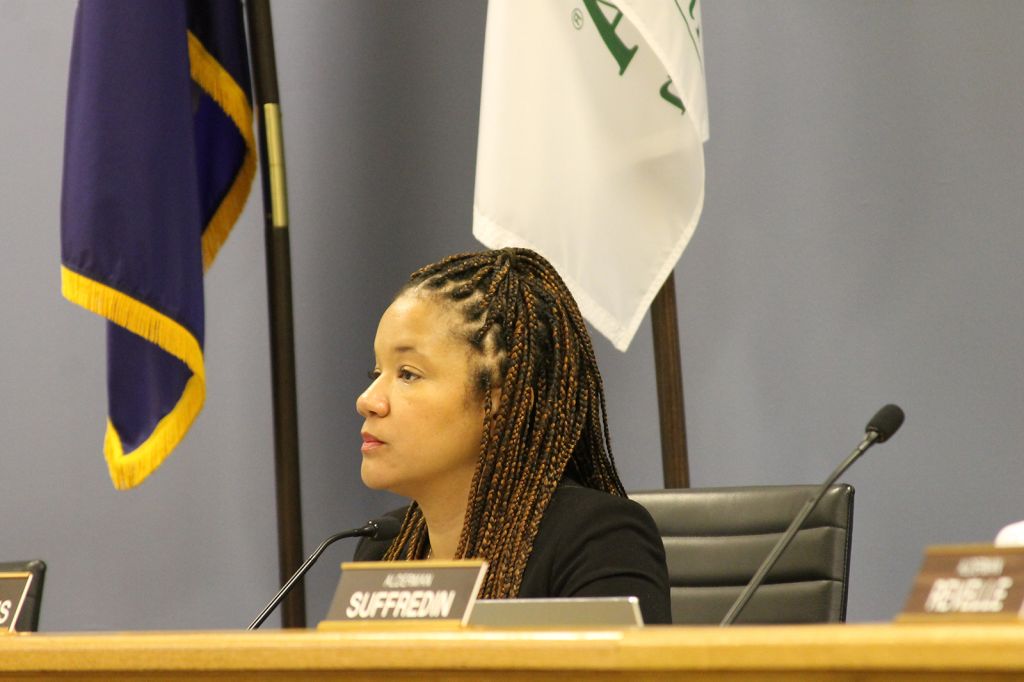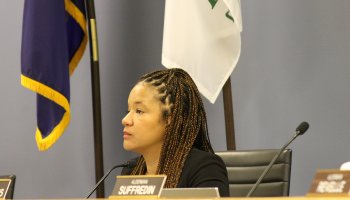
Source: Chicago Tribune / Getty
Just a few miles north of Chicago, the city of Evanston, Illinois is known as the home to Northwestern University and regarded as one of the best places to live in the U.S. But in 2019, a vote by the city council gained Evanston more notoriety as the first city in the United States to officially install a program dedicated to repairing the widening gap between white and Black people in terms of opportunity and wealth.
Resolution 126-R-19 made the world stop and take notice of the woman that helped to make it all possible—Robin Rue Simmons, Alderman of Evanston’s 5th Ward. Her personal journey to this point and her commitment to make this happen, is something to take note of as she gains more recognition with her recent nomination to the National African-Americans Reparations Commission as her current term as alderman ends this month.
The adopted resolution is set to distribute $10 million dollars over the next decade to eligible Black households in Evanston that have ties to the city between 1919 and 1969 and those who were subject to discrimination via housing policies in the city after 1969. Once qualified, each household would receive $25,000 towards mortgage payments, down payments on property and other home-related expenses. The majority of these funds will be drawn from a 3% tax levied on the sale of recreational marijuana.
Rue Simmons is an Evanston native, born in the same Fifth Ward that she has represented and still lives in as a mother of two children since being elected to the position in 2017. In interviews, Ms. Rue Simmons has spoken about growing up and being acutely aware of the divisions within the city. For her, getting past the boundary streets of where she was raised and seeing the stark differences between her neighborhood and the white neighborhoods that boasted spacious homes and better amenities left an impact on her that lasted throughout high school and college. Rue Simmons would go on to create multiple businesses as she began her career as a real estate broker. These included a construction company that employed skilled workers of color which developed affordable homes in the area through and a bookstore that had free afterschool programs. These successes and the accolades she received from her community and the city compelled her to run for alderman.
There was a previous attempt by a previous three-term alderman of Evanston and now Cook County judge, Lionel Jean-Baptiste. His work introduced a resolution acknowledging the need for reparations but it stalled without having the right funding behind it. Rue Simmons aimed to capitalize on this in a new way after being elected, taking note of the city’s other Black business owners which comprised 12.3% of businesses in Evanston. She began to have in-depth discussions with her fellow council members. She also organized public hearings where residents could voice their opinions to the council. Rue Simmons enlisted the help of a real estate historian to help provide context to the discrimination Black people faced in buying homes as opposed to whites in the past and currently with recent development in and around her ward.
In June of 2019, the city council issued a public resolution acknowledging Evanston’s history of racial injustice and discrimination. It gained time for Rue Simmons to work on the final component – taxing revenue from the future sales of marijuana. It was a tax most in the city wouldn’t notice as opposed to an earlier idea of adding a real estate tax. Also, it would illuminate for many the gross disparity of Blacks as opposed to whites when it came to marijuana – one stat showed that Black people made up 70% of arrests in Evanston despite making up only 16% of the population.
With her work to make reparations for African-Americans in the United States a firm and achievable goal, Robin Rue Simmons has helped to make a lane where it can be possible. Even House Representative Sheila Jackson-Lee, sponsor of the H.R. 40 bill to commission a federal study on reparations, has cited her work as an influence. It’s plain to see that Robin Rue Simmons will be a name to watch in conjunction with other strong Black women political figures in the country.
Be sure to tune in to Urban One Honors on TV One on Sunday, May 16 to give ‘Women Leading the Change’ like Robin Rue Simmons, Stacey Abrams and more their flowers.
‘Urban One Honors’ Honoree Robin Rue Simmons Is A Trailblazer for Reparations was originally published on hiphopwired.com
















